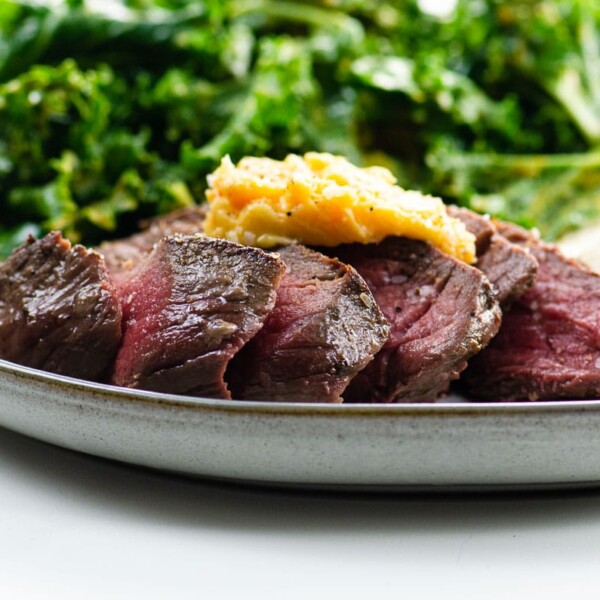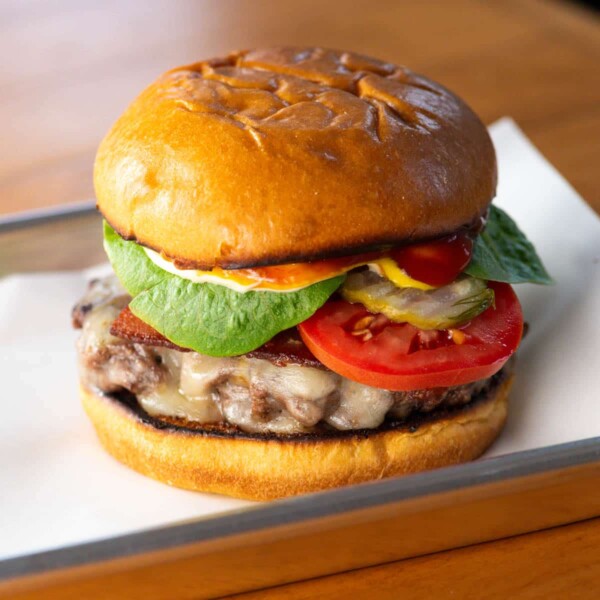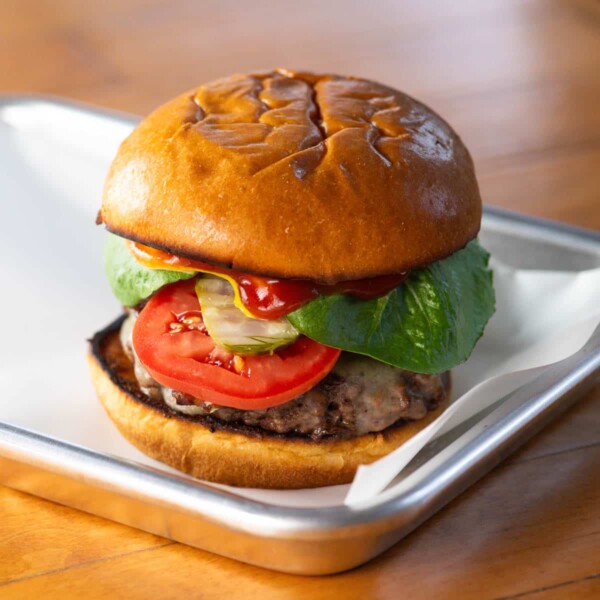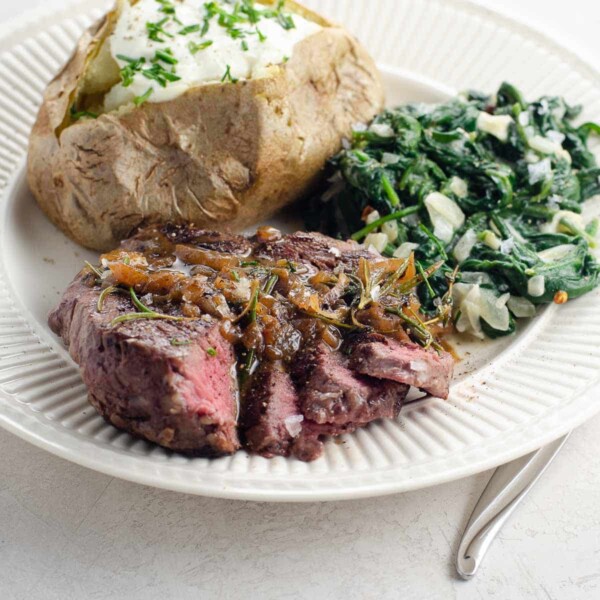This post may contain affiliate links. Learn more.
Top sirloin steak is tender, quick to cook, and delightfully flavorful. Four-ingredient miso butter dolloped over the warm steak makes a gorgeous, umami-packed sauce as it melts.
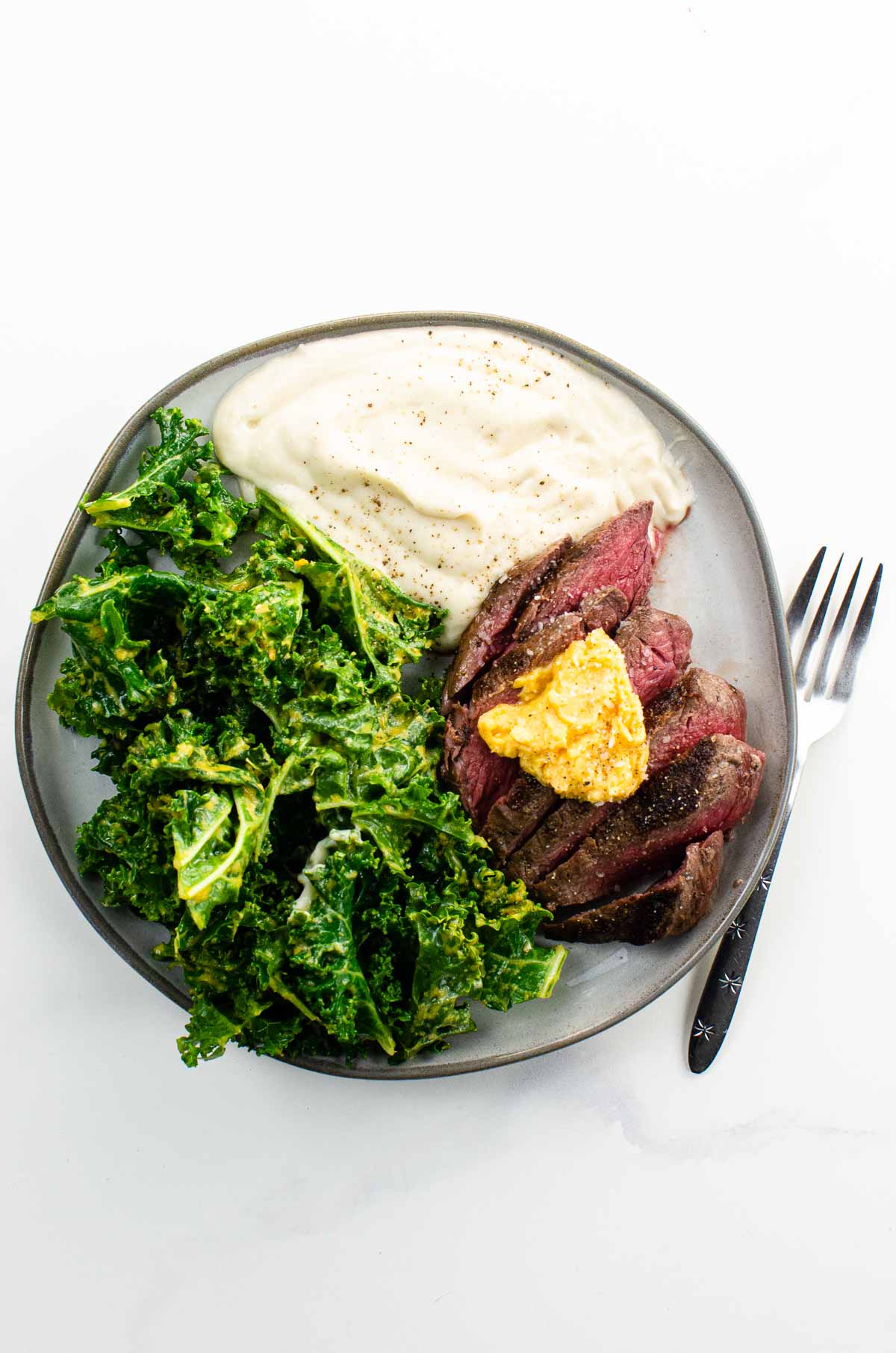
Why we love this recipe
Top sirloin is sometimes adorably referred to as weeknight steak since it’s relatively inexpensive and cooks quickly on the stovetop. But don’t be fooled into thinking it isn’t special. It holds its own without any more adornment than a sprinkling of salt and pepper. But especially when topped with miso butter, it:
- Packs a deep, savory flavor punch
- Makes beautiful, tender slices (or serve these petite steaks whole)
- Pairs with virtually any side dish
- Cooks in a humble cast iron pan in about six minutes
What you’ll need
Here’s a glance at the ingredients you’ll need to make this recipe.
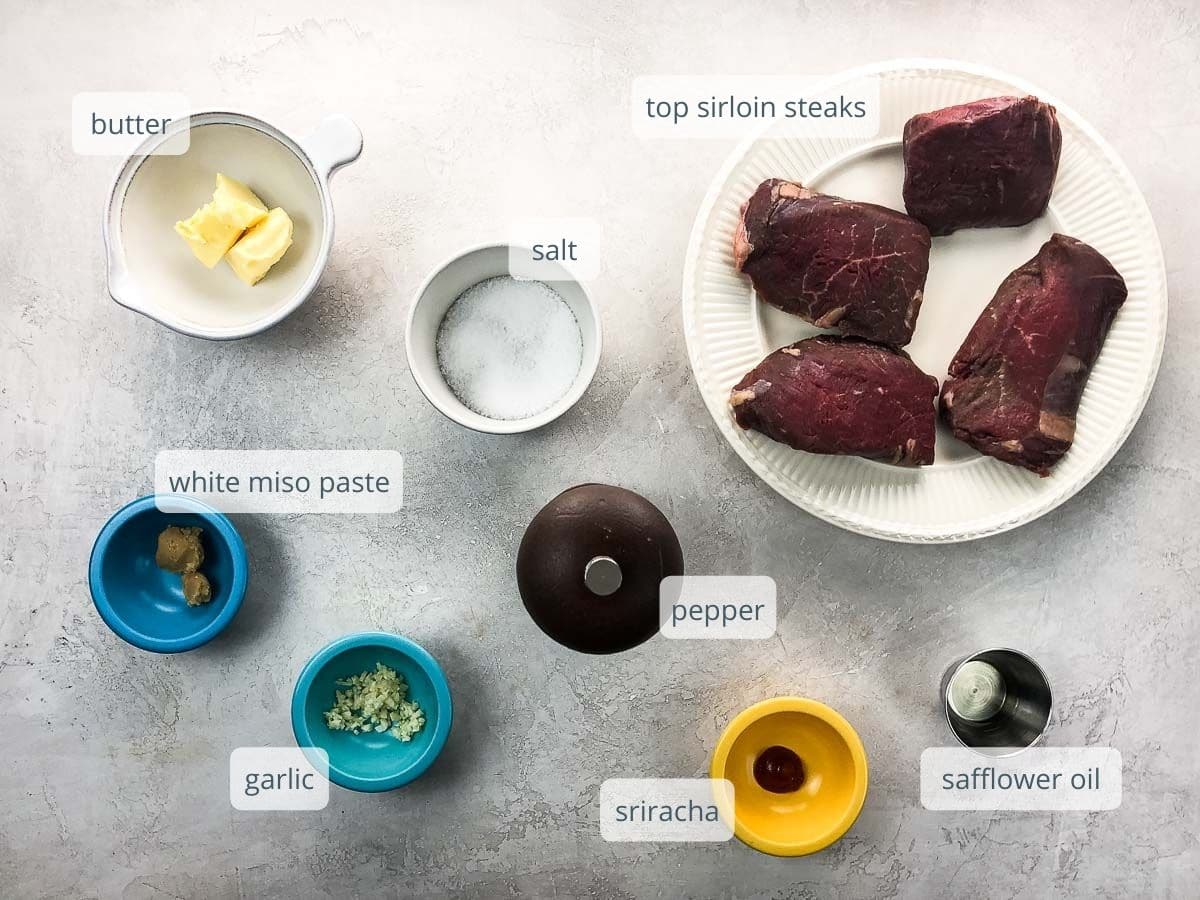
- Top sirloin is a lean, flavorful, and super-versatile cut. You can cube it for stew, but you can also sear it in a blazing hot cast iron pan for just a few minutes per side, let it rest, and slice it into a perfect, absurdly tender, right-sized steak dinner.
- White miso is the same fermented soybean paste that gets stirred into your favorite miso soup. It’s an umami powerhouse with a balanced flavor profile that brings out the best in these steaks. Bonus: Miso’s live, active cultures are great for your gut microbiome.
- Sriracha is optional but great. In the amount we use, it doesn’t really make the sauce spicy — it just adds tons of flavor. If you prefer, you can leave it out and still have a great result.
- I tend to default to safflower oil for searing, but you can use any neutral-tasting oil with a high smoke point. Other good choices are canola, peanut, or a vegetable oil blend.
My favorite sources for meat & pantry staples
For years, I’ve been sourcing our meat from ButcherBox. We love this curated meat delivery service, which provides grass-finished beef, heritage breed pork, organic chicken, and more from small farms direct to the customer. You can learn more in my extensive Butcher Box review and unboxing.
I love Thrive Market for a wide variety of products. Often described as one part Whole Foods, one part Costco, they’re a membership-based online market for healthier products at discounted prices. Plus, they’re mission-driven, engaged in the community, and not currently owned by a giant corporation. You can learn more in my Thrive Market review and unboxing.
How to make it
Here’s what you’ll do to make this recipe great. You can see the steps in action in the video that accompanies this post, and get all the details in the recipe card below.
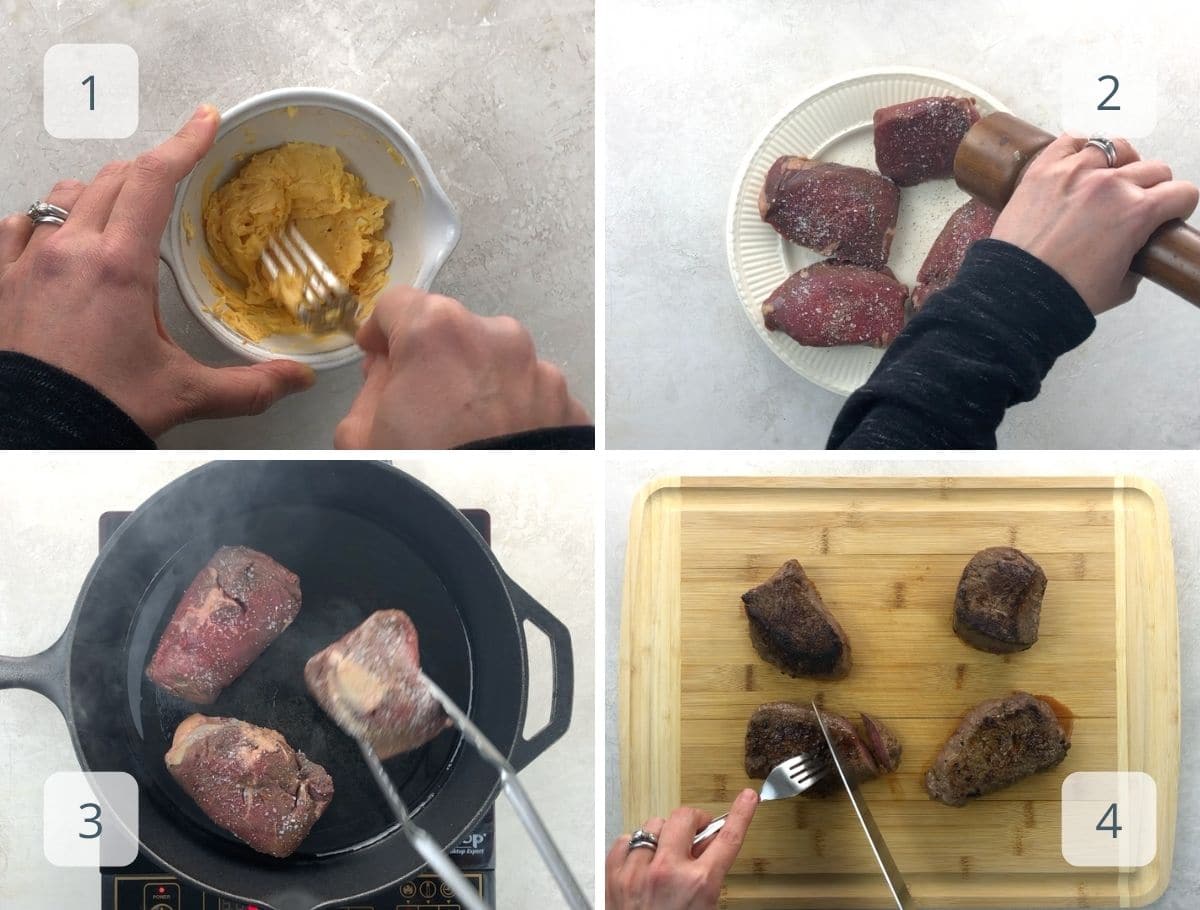
- In a small bowl, mix together softened butter with the miso paste, sriracha, and minced garlic.
- Dry the steaks well with paper towels. Generously salt and pepper both sides.
- Preheat a 12-inch cast iron pan, then sear the steaks for about three minutes per side for rare to medium-rare (depending on thickness).
- Let the steaks rest for at least five minutes, then slice against the grain (or serve whole and let people cut their own). Dollop with miso butter and serve.
Expert tips and FAQs
Seared in a blazing hot cast iron pan, your steaks will be done in no time. I prefer this lean cut cooked rare to medium-rare.
For rare (but not too rare), pull the steaks off the heat when the internal temperature reads 125°F. Depending on the thickness of your steak, this should take about 3 minutes per side.
For medium-rare, pull the steaks off at 130°F.
Let steaks rest for at least five minutes before slicing. This allows for “carryover cooking,” where the residual heat continues to cook the meat a bit. It also allows the meat to reabsorb more of the juices, so the steak stays juicy rather than losing all that goodness to the carving board.
P.S. Here’s my favorite affordable instant-read thermometer.
The muscle fibers in a steak run in a particular direction, and you’ll be able to see them clearly when the meat is cooked. They’ll appear as visible lines or striations running along the steak. Your task is to cut perpendicular to those lines. This results in tender bites of beef, eliminating any undesirably chewiness by shortening the fibers.
You can refer to the photo above, and the video, to see what this looks like in action.
Leftovers will keep well in an airtight container in the fridge for up to a week. Protip: Sliced steak and miso butter make a great sandwich.
How to serve it
Top sirloin steak with miso butter plays well with a wide variety of sides, from traditional to unexpected. It’s pictured here with kale salad and mashed cauliflower. Here are a few of our other favorite accompaniments:
- Mashed or baked potatoes
- Broccolini
- Steakhouse or keto creamed spinach
- Bok choy and wasabi mashed potatoes
More favorite steak recipes
Like steak? You’ll love some of our other favorite recipes:
- Sirloin cap with (or without) chimichurri
- Filet mignon with easy shallot-herb pan sauce
- Carne asada tacos
- Grilled skirt steak on a salad
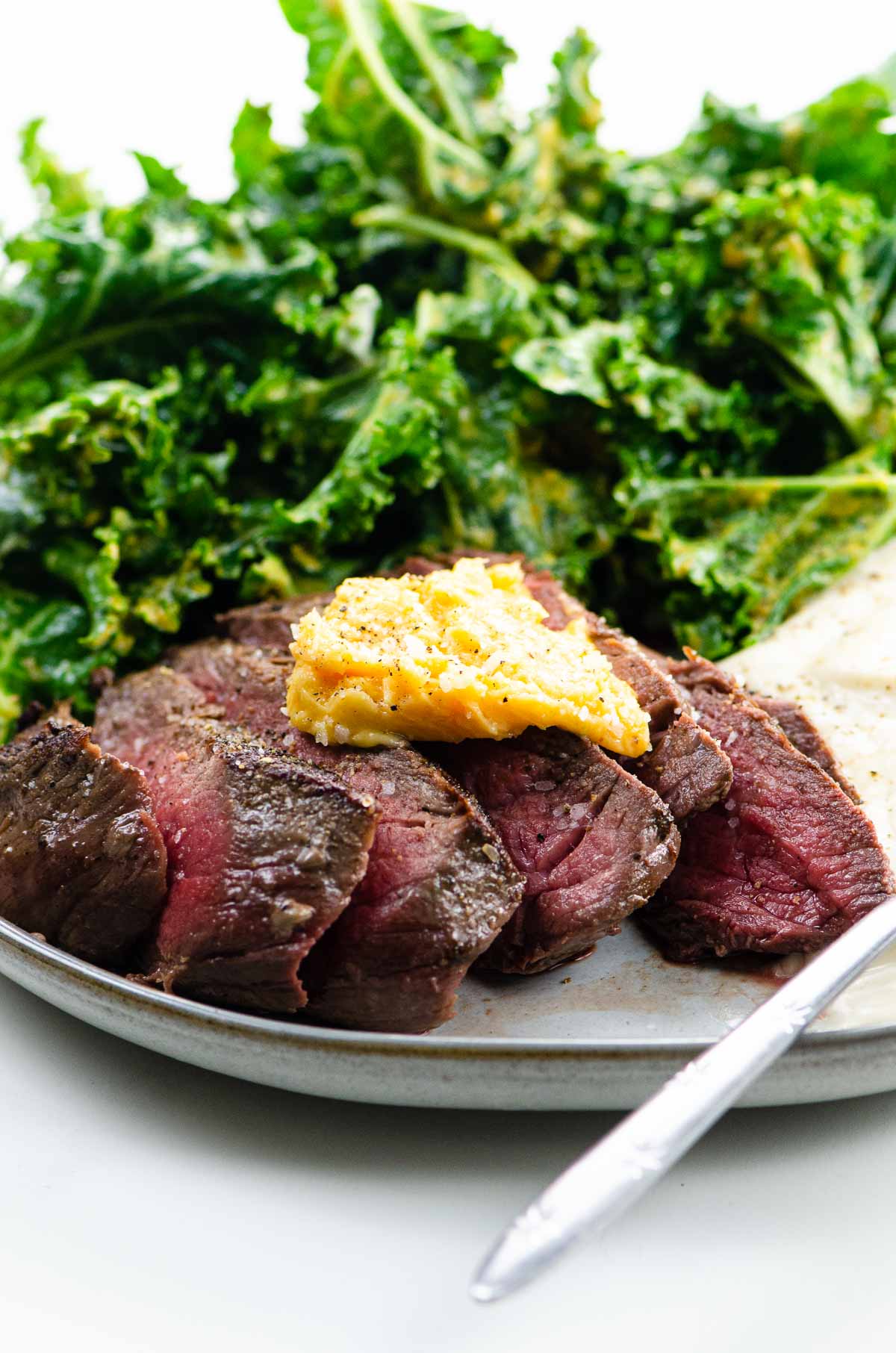
Summarize & Save This Content On
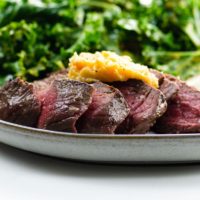
Top Sirloin Steak with Miso Butter
Equipment
Ingredients
- 3 tablespoons (42 grams) butter, at room temperature
- 2 teaspoons (10 grams) white miso paste
- 1 large garlic clove, minced
- ½ teaspoon sriracha
- 4 6- ounce 170-gram top sirloin steaks
- 1 tablespoon (15 ml) safflower oil
- Salt and pepper
Instructions
- Set a 12-inch cast iron skillet over high heat on the stovetop. Let it preheat while you make the miso butter and prep the steaks.
- Make the miso butter: In a small bowl, stir together the butter, miso, garlic, and sriracha until completely mixed. Set aside.
- Dry the steaks very well with paper towels. Generously sprinkle both sides with salt and pepper.
- Swirl the safflower oil into the hot pan and heat until it just starts to smoke.
- Add the steaks in a single layer, without crowding. Sear for three minutes on the first side. They’ll develop a nice brown crust.
- Flip each steak and sear on the other side, about three minutes more. See note 7 below for more information about temperature.
- Let the steaks rest on a plate or carving board for at least five minutes. Then slice against the grain or serve whole. Top each steak with a dollop of miso butter right before serving.
- A note on slicing meat against the grain: The muscle fibers in a steak run in a particular direction, and you’ll be able to see them clearly when the meat is cooked. They’ll appear as visible lines or striations running along the steak. Your task is to cut perpendicular to those lines. This results in tender bites of beef, eliminating any undesirably chewiness by shortening the fibers. You can see this in action in the video.
- If it’s important to you that this meal be gluten-free, be sure to use a gluten-free brand of miso.
Notes
- Top sirloin is a lean, flavorful, and super-versatile cut. You can cube it for stew, but you can also sear it in a blazing hot cast iron pan for just a few minutes per side, let it rest, and slice it into a perfect, absurdly tender, right-sized steak dinner.
- White miso is the same fermented soybean paste that gets stirred into your favorite miso soup. It’s an umami powerhouse with a balanced flavor profile that brings out the best in these steaks. Bonus: Miso’s live, active cultures are great for your gut microbiome.
- Sriracha is optional but great. In the amount we use, it doesn’t really make the sauce spicy — it just adds tons of flavor. If you prefer, you can leave it out and still have a great result.
- You can use salted or unsalted butter. I prefer a good-quality salted, cultured butter from grass-fed cows (such as Kerrygold).
- I tend to default to safflower oil for searing, but you can use any neutral-tasting oil with a high smoke point. Other good choices are canola, peanut, or a vegetable oil blend.
- If you want to get fancy, you can make the miso butter in advance, then dollop it onto a piece of plastic wrap and roll it into a log. Chill until firm, then slice and top steaks.
- For rare but not too-rare steaks (my preference for top sirloin), cook until the internal temperature reads 125°F on an instant thermometer. Depending on thickness, this should take about three minutes per side. For medium-rare, cook to 130°F. In any case, let rest for at least five minutes before slicing, to ensure carryover cooking and juice reabsorption.
- Store any leftovers in the fridge for up to a week. They make great sandwiches.
Nutrition
Nutrition information is automatically calculated, so should only be used as an approximation.

